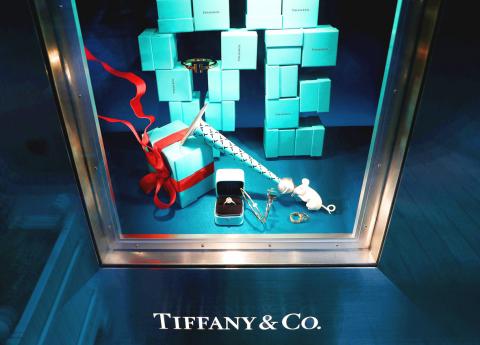LVMH Moet Hennessy Louis Vuitton SE agreed to buy Tiffany & Co for more than US$16 billion in the largest luxury goods deal ever, raising the French conglomerate’s profile in jewelry and giving it access to a broader swath of US shoppers.
The owner of the Louis Vuitton brand agreed to pay US$135 a share for the US jeweler, according to a statement yesterday.
That values Tiffany 37 percent above the closing price before Bloomberg reported an initial US$120-a-share approach on Oct. 26.

Photo: Reuters
Boards of both companies approved the proposal on Sunday.
LVMH chairman Bernard Arnault is challenging Cartier owner Richemont for dominance in the global jewelry business.
While LVMH’s stable of brands includes Christian Dior fashion and Dom Perignon Champagne, the company has not been as prominent in jewelry as in fashion or cosmetics.
Acquiring Tiffany changes that.
“It will become the luxury jewelry global-market leader,” Bloomberg Intelligence analyst Deborah Aitken wrote in a report.
The acquisition is set to more than double LVMH’s jewelry scale and boost its market share to more than 18 percent, she said.
“Tiffany makes sense for LVMH because of the scarcity of acquisition targets with global scale and brand appeal in jewelry, the least-crowded category in the luxury sector,” wrote Rogerio Fujimori, an analyst at RBC Europe.
The all-cash deal is expected to close in the middle of next year. LVMH shares rose as much as 2 percent in morning trading in Paris, approaching a record.
Tiffany’s shares rose 6 percent in premarket trading in New York City.
They have traded steadily above the initial offer price since Bloomberg News first reported the talks late last month.
The deal cements a successful streak for Arnault’s firm, with LVMH’s stock price quadrupling during the past eight years.
To fuel growth, the billionaire, who is Europe’s richest person, has embraced acquisitions, spending more than US$12 billion across 19 deals since the start of 2016, according to Bloomberg Intelligence.
Yet even with that spree, LVMH has lagged behind Richemont in luxury jewelry, a significant area of growth in emerging markets such as China.
LVMH’s last major deal in that area was in 2011, when it acquired the Bulgari brand.
LVMH raised its bid for Tiffany at least twice before coming to an accord, bolstering its offer to US$130 just days ago, according to people with knowledge of the situation.
While the company dwarfs Tiffany, with sales of about US$50 billion, some analysts had predicted LVMH might need to pay even more, with price targets of US$140 at Credit Suisse Group AG and US$160 at Cowen & Co.
The revised price tag might reflect the changing fortunes of Tiffany, where chief executive officer Alessandro Bogliolo has cut back on entry-priced gifting options and revamped its marketing to target younger shoppers after a difficult period when the firm lost track of consumer trends.
Offerings from the 182-year-old brand include US$165 heart-shaped earrings, as well as top-end options like a US$165,000 diamond chain.

SEEKING CLARITY: Washington should not adopt measures that create uncertainties for ‘existing semiconductor investments,’ TSMC said referring to its US$165 billion in the US Taiwan Semiconductor Manufacturing Co (TSMC, 台積電) told the US that any future tariffs on Taiwanese semiconductors could reduce demand for chips and derail its pledge to increase its investment in Arizona. “New import restrictions could jeopardize current US leadership in the competitive technology industry and create uncertainties for many committed semiconductor capital projects in the US, including TSMC Arizona’s significant investment plan in Phoenix,” the chipmaker wrote in a letter to the US Department of Commerce. TSMC issued the warning in response to a solicitation for comments by the department on a possible tariff on semiconductor imports by US President Donald Trump’s

The government has launched a three-pronged strategy to attract local and international talent, aiming to position Taiwan as a new global hub following Nvidia Corp’s announcement that it has chosen Taipei as the site of its Taiwan headquarters. Nvidia cofounder and CEO Jensen Huang (黃仁勳) on Monday last week announced during his keynote speech at the Computex trade show in Taipei that the Nvidia Constellation, the company’s planned Taiwan headquarters, would be located in the Beitou-Shilin Technology Park (北投士林科技園區) in Taipei. Huang’s decision to establish a base in Taiwan is “primarily due to Taiwan’s talent pool and its strength in the semiconductor

An earnings report from semiconductor giant and artificial intelligence (AI) bellwether Nvidia Corp takes center stage for Wall Street this week, as stocks hit a speed bump of worries over US federal deficits driving up Treasury yields. US equities pulled back last week after a torrid rally, as investors turned their attention to tax and spending legislation poised to swell the US government’s US$36 trillion in debt. Long-dated US Treasury yields rose amid the fiscal worries, with the 30-year yield topping 5 percent and hitting its highest level since late 2023. Stocks were dealt another blow on Friday when US President Donald

UNCERTAINTY: Investors remain worried that trade negotiations with Washington could go poorly, given Trump’s inconsistency on tariffs in his second term, experts said The consumer confidence index this month fell for a ninth consecutive month to its lowest level in 13 months, as global trade uncertainties and tariff risks cloud Taiwan’s economic outlook, a survey released yesterday by National Central University found. The biggest decline came from the timing for stock investments, which plunged 11.82 points to 26.82, underscoring bleak investor confidence, it said. “Although the TAIEX reclaimed the 21,000-point mark after the US and China agreed to bury the hatchet for 90 days, investors remain worried that the situation would turn sour later,” said Dachrahn Wu (吳大任), director of the university’s Research Center for